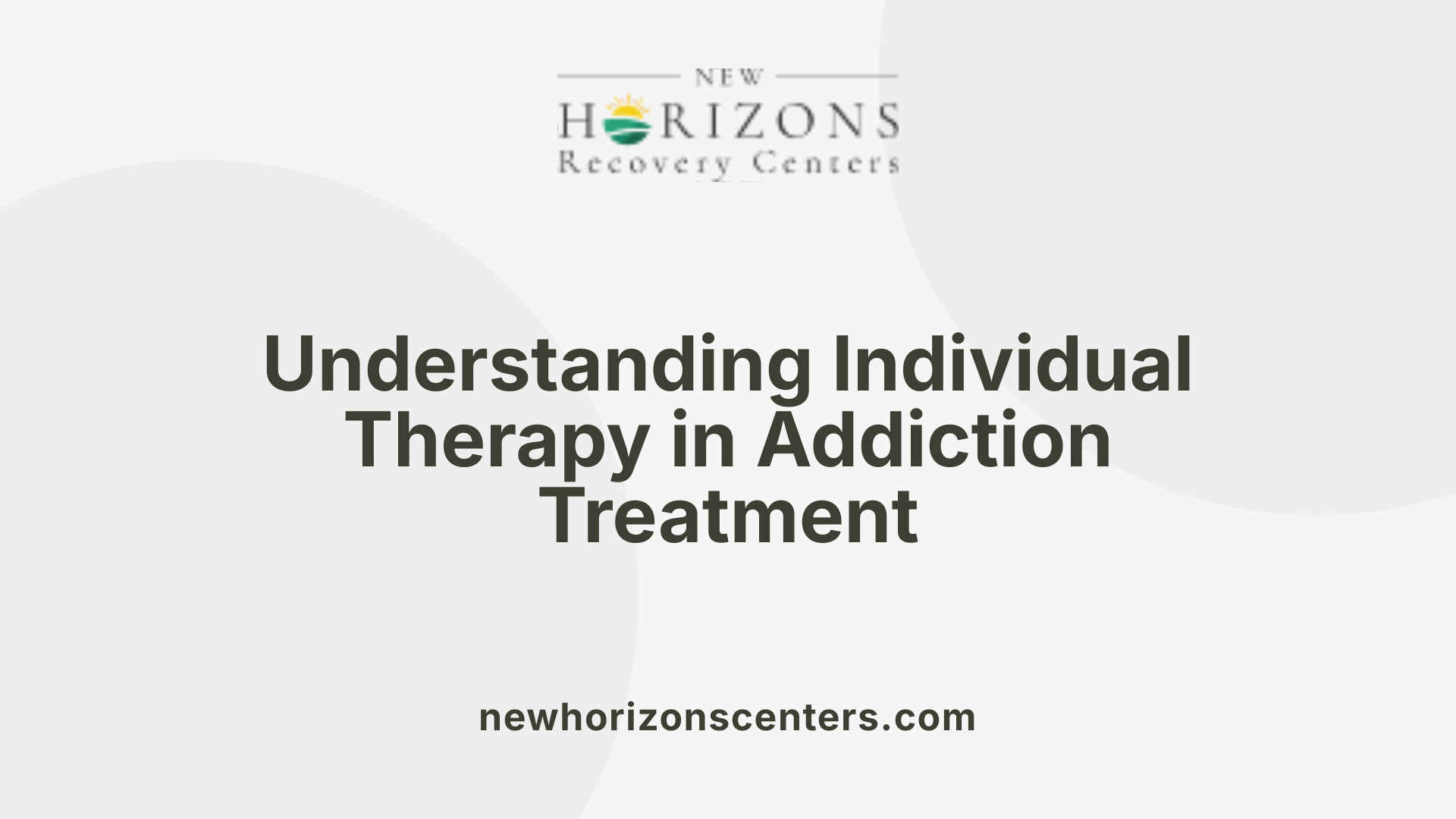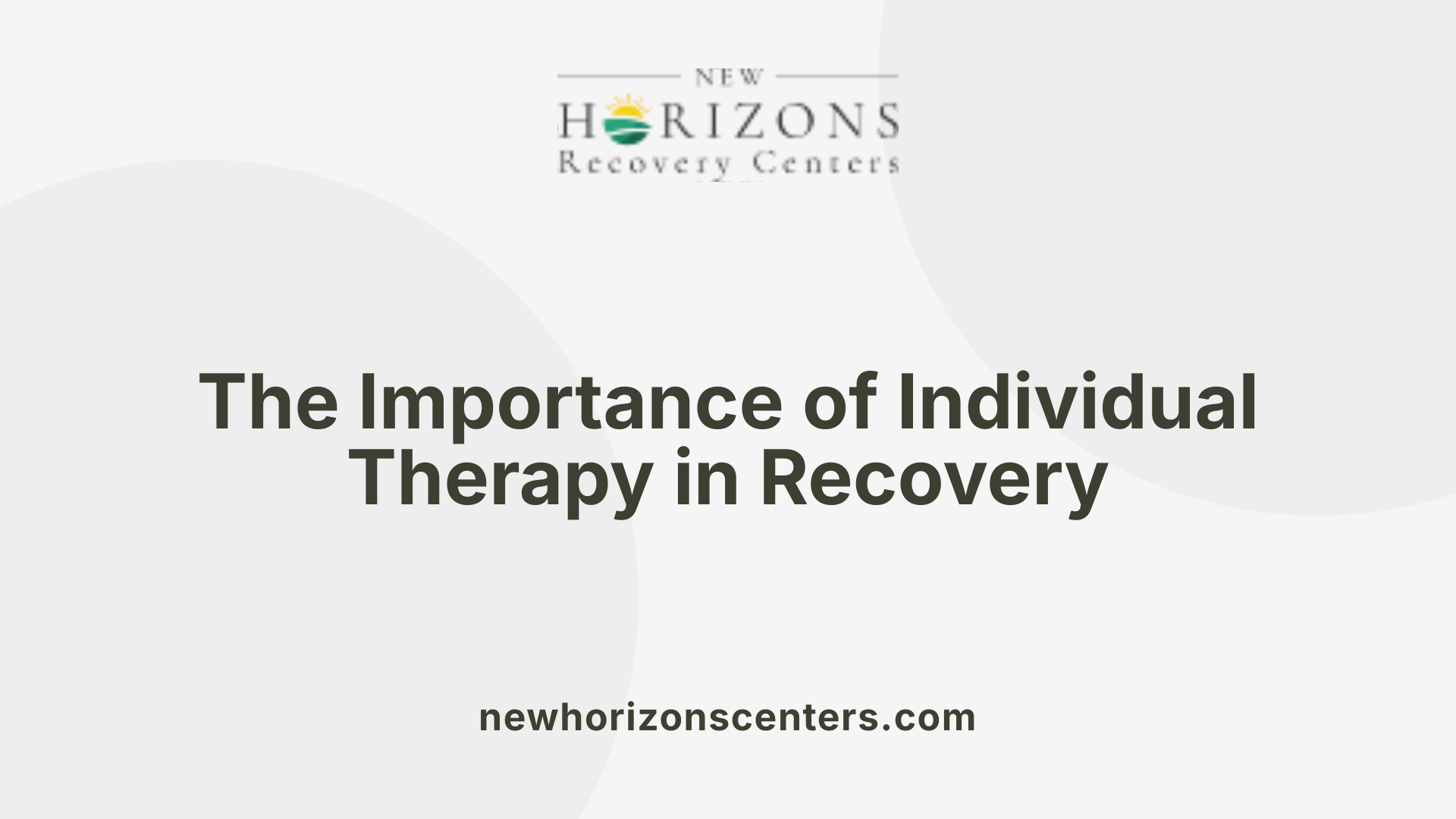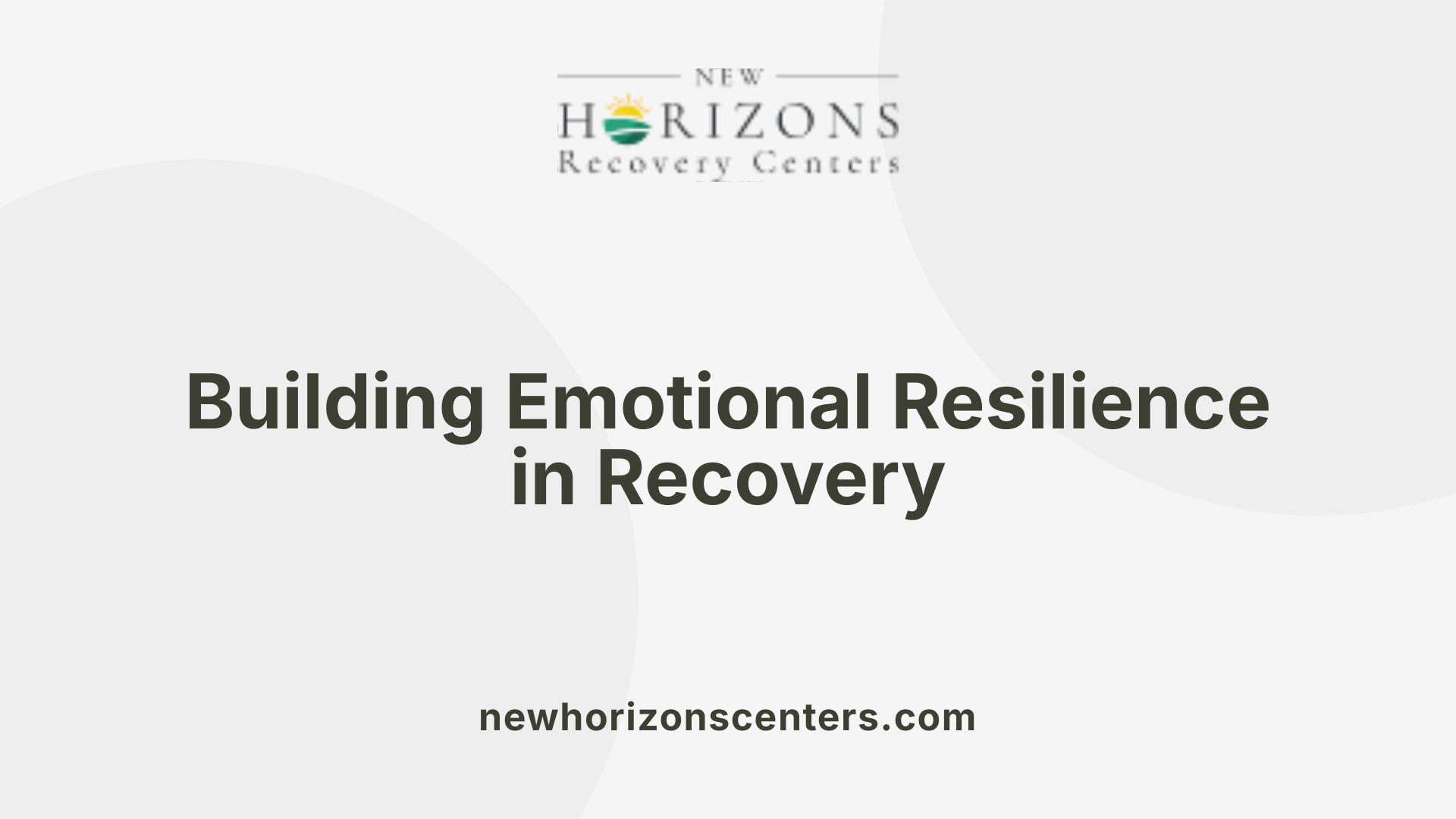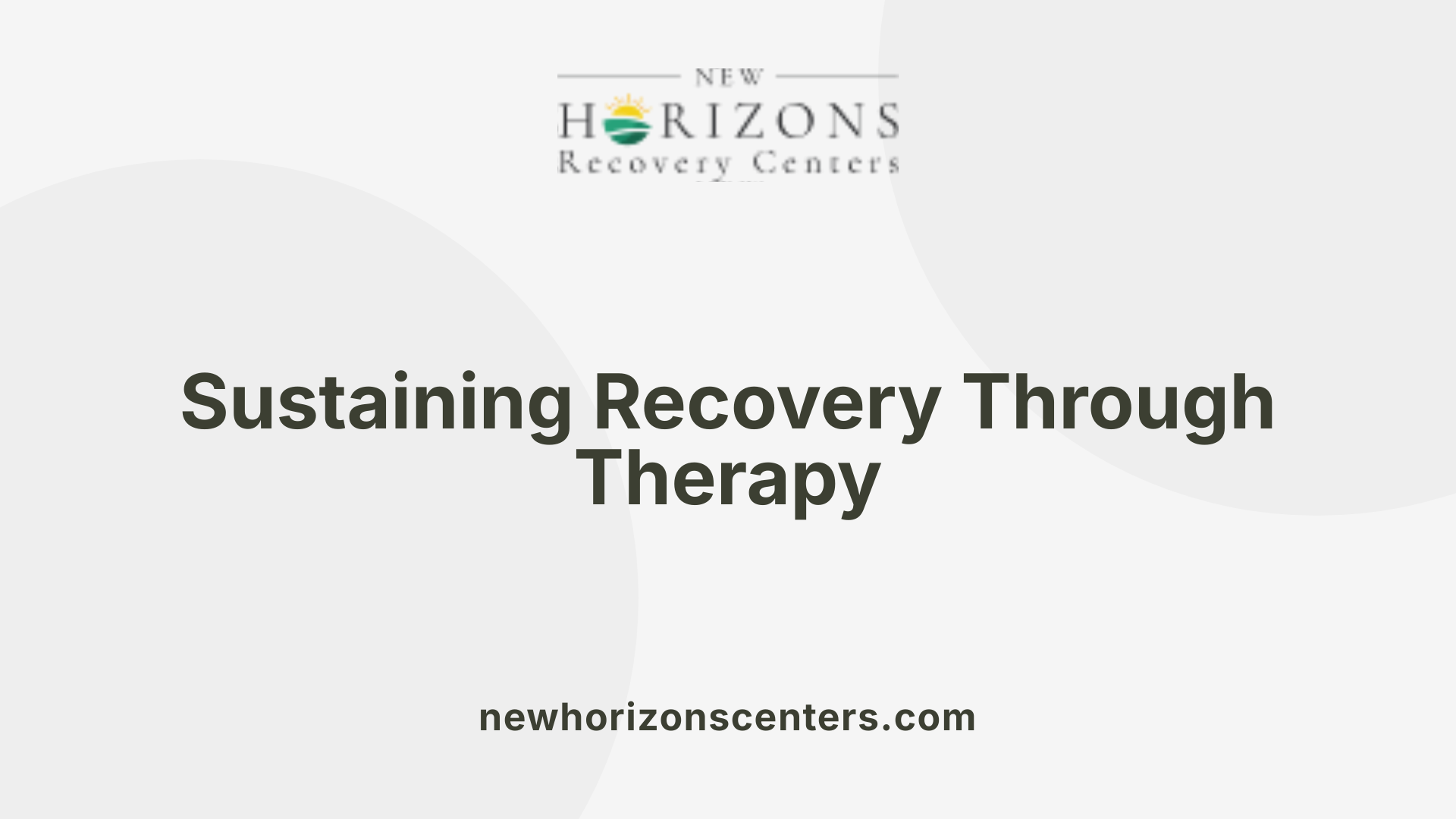Exploring Individual Therapy's Unique Value in Recovery
As society continues to grapple with the pervasive impacts of addiction, understanding and leveraging effective treatment solutions become paramount. Individual therapy, a cornerstone of comprehensive rehabilitation programs, serves a distinct and vital function in guiding individuals towards sustained recovery. Providing a one-on-one setting, this form of therapy enables a uniquely personal exploration of one's thoughts and behaviors, offering tailored therapeutic intervention crucial for tackling the complexities of addiction.
Defining Individual Therapy's Role in Addiction

What is individual therapy in the context of addiction treatment?
Individual therapy, often referred to as psychotherapy or talk therapy, entails personalized one-on-one sessions between a client and a trained therapist. This approach is tailored to meet an individual’s mental health needs, allowing for deep exploration of personal experiences and challenges related to addiction. Techniques employed in individual therapy may include Cognitive Behavioral Therapy (CBT), which is recognized for its effectiveness in addressing conditions such as depression and anxiety. The foundation of this therapy lies in the therapeutic alliance—a strong, trusting relationship that encourages openness and healing.
What is the purpose of individual therapy for addiction recovery?
The primary purpose of individual therapy in addiction recovery is to create a safe space where clients can gain insight into their thoughts and behaviors. In this private setting, individuals can discuss their challenges without fear of judgment, fostering trust and support. Therapists employ various methods, such as CBT or Dialectical Behavioral Therapy (DBT), aiming to help clients manage stress, cope with difficult emotions, and identify unhealthy behavior patterns.
Benefits of individual therapy encompass enhancing self-awareness, fostering accountability, and developing effective coping strategies that lead to lasting positive changes in one’s life. It plays an integral role in addressing the complexities of addiction, complementing group therapy by focusing on the unique needs of each individual.
Through individual therapy sessions, clients can not only confront their addiction but also uncover underlying issues such as trauma or mental health disorders that may contribute to their substance use, paving the way toward a healthier future.
Why Individual Therapy Is a Staple in Recovery Programs

Why is individual therapy used in addiction recovery?
Individual therapy is central to addiction recovery because it provides a private environment where individuals can process thoughts, feelings, and experiences without judgment. This one-on-one interaction allows clients to delve into the emotional complexities associated with their addiction. Research shows that personal therapy effectively helps identify the root causes of addiction, equipping individuals with the skills needed to embrace sobriety.
Therapists utilize evidence-based techniques such as Cognitive Behavioral Therapy (CBT) to reshape harmful thought patterns. CBT encourages clients to develop coping strategies and manage cravings effectively. Furthermore, individual therapy addresses co-occurring mental health issues, like depression and anxiety, commonly seen in those battling substance use.
By working closely with a therapist, clients can set realistic recovery goals, allowing for a tailored approach to their needs. This personalized support reinforces motivation and fosters emotional resilience, which are crucial for sustainable recovery.
How does it help in addressing underlying causes of addiction?
Individual therapy enables deeper exploration into the underlying causes of addiction, including trauma or unresolved emotional pain. Through tailored interventions, clients focus on their unique triggers, building awareness and coping mechanisms that promote healthier responses to stressors.
The therapeutic relationship established in individual therapy is vital for facilitating open discussions about sensitive topics that may not be addressed in group settings. This depth of personal exploration aids in discovering healthier behaviors and enhances self-awareness, ultimately leading to long-term recovery. Moreover, addressing these core issues significantly lessens the likelihood of future substance misuse by developing a comprehensive and holistic understanding of one’s addiction.
Exploring Therapeutic Techniques in One-on-One Therapy
What are some types of therapeutic approaches used in individual therapy for addiction?
Various therapeutic approaches enhance individual therapy for addiction recovery, allowing therapists to tailor interventions to a client's needs. Here are some significant methods:
Cognitive Behavioral Therapy (CBT):
- Focus: Identifies and alters negative thought patterns contributing to addiction.
- Goal: Equip clients with coping skills to manage cravings and prevent relapse.
Dialectical Behavior Therapy (DBT):
- Focus: Emphasizes mindfulness and emotional regulation.
- Goal: Helps clients develop skills for managing stress and cravings effectively.
Psychodynamic Therapy:
- Focus: Explores how past trauma influences current behaviors.
- Goal: Address underlying issues tied to substance use to alleviate distress.
Motivational Interviewing (MI):
- Focus: Enhances motivation to change substance use behaviors.
- Goal: Foster internal motivation by exploring reasons for change and reinforcing commitment.
Interpersonal Psychotherapy (IPT):
- Focus: Improves interpersonal relationships and social functionality.
- Goal: Address social factors that may affect recovery and support emotional health.
Contingency Management (CM):
- Focus: Reinforces positive behavior change through tangible rewards.
- Goal: Encourage sobriety and participation in treatment by rewarding positive actions.
Each of these approaches emphasizes a strong therapeutic alliance, which is critical for fostering trust and encouraging open communication, ultimately leading to better treatment outcomes.
Synergizing Therapy Approaches for Optimal Recovery
How does individual therapy complement other addiction treatment modalities?
Individual therapy plays a crucial role in enhancing other addiction treatment modalities by providing tailored, personalized support that caters to the individual’s unique background and needs. While interventions such as detoxification, inpatient, and outpatient rehabilitation emphasize structural aspects of recovery, individual therapy delves into the emotional and psychological facets, exploring the root causes of addiction. This personalized attention allows clients to work through their specific thoughts, emotions, and experiences that contribute to substance misuse.
Therapeutic techniques such as Cognitive Behavioral Therapy (CBT) and Dialectical Behavioral Therapy (DBT) significantly enhance coping mechanisms and foster emotional regulation, essential for long-term recovery. Moreover, integrating individual therapy with group therapy and family counseling fosters a holistic approach. Group settings provide mutual support and accountability, while family therapy helps to rebuild communication within the family unit, reinforcing a support system. This combined method not only respects personal recovery journeys but ensures that individuals also benefit from collective experiences and understanding.
Ultimately, individual therapy is more than an adjunct; it is a vital piece of the puzzle that strengthens the overall effectiveness of addiction treatment, promoting self-awareness, emotional resilience, and personal growth within patients.
Tailoring Treatment to Individual Needs in Therapy
How does individual therapy address the unique needs of individuals in addiction treatment?
Individual therapy addresses the unique needs of individuals in addiction treatment by allowing for personalized attention and the creation of tailored treatment plans. This method focuses on the specific challenges faced by each person, ranging from past traumas to co-occurring mental health issues.
In a safe, confidential environment, clients can explore the roots of their addiction. Therapists utilize evidence-based therapies such as Cognitive Behavioral Therapy (CBT) to help individuals identify and manage triggers while challenging negative thought patterns that may contribute to substance use.
While individual therapy offers focused approaches toward recovery, it complements group therapy by enhancing motivation and personal efficacy. Clients benefit from undivided attention, making it easier to confront complex emotions and develop sustainable coping mechanisms.
The one-on-one nature of these sessions plays a crucial role in supporting individuals at various stages of their recovery journey, ensuring that treatment is not only effective but also specifically aligned with each individual's personal experiences and struggles.
How does therapy adapt to individual challenges?
Therapy is inherently adaptive, with therapists customizing their approaches based on individual needs and situations. During sessions, therapists not only allow for deeper emotional exploration but also continuously adjust strategies as clients progress through recovery.
For instance, a therapist may incorporate techniques from Dialectical Behavior Therapy (DBT) to enhance emotional regulation skills as a client learns to manage cravings and stressors. This ongoing modification ensures that therapy remains relevant and effective as life circumstances and personal challenges evolve.
Crucially, therapy also emphasizes building a therapeutic alliance, fostering trust between the client and therapist. This relationship enables individuals to share their unique triggers and stressors more openly, facilitating tailored interventions and stronger support systems, both of which contribute to long-term recovery success.
Building a Therapeutic Relationship: The Key to Healing
What is the importance of the therapeutic relationship in individual therapy for addiction?
The therapeutic relationship in individual therapy for addiction is crucial for effective healing. It offers a safe space where clients can explore their feelings and thoughts related to substance use without fear of judgment. This supportive environment fosters trust between the therapist and client, enabling open and honest discussions about their struggles, which is essential for effective recovery.
A strong therapeutic alliance can significantly motivate clients to engage in the treatment process. When therapists understand and validate the clients' experiences, it helps them navigate the complex emotional challenges that often accompany addiction. This trust encourages accountability and enhances a client’s willingness to adhere to treatment plans.
Ultimately, a solid therapeutic relationship serves as a foundation for personal growth, facilitating the development of critical coping strategies that are essential for long-term recovery from addiction. By nurturing this relationship, clients are more likely to achieve their recovery goals and sustain their progress post-therapy.
Developing Emotional Resilience and Coping Through Therapy

What are the impacts of individual therapy on emotional understanding and coping skills in addiction recovery?
Individual therapy plays a crucial role in enhancing emotional understanding and developing effective coping skills for those recovering from addiction. In these one-on-one sessions, clients are provided with a safe and confidential space to explore complex emotions associated with their substance use. Through the guidance of skilled therapists, individuals learn to process feelings of shame, guilt, and grief without fear of judgment.
Therapists focus on reframing distressing situations, which fosters greater self-awareness and insight. This empathetic approach not only alleviates feelings of isolation but also aids in developing a deeper understanding of one’s emotional landscape. Techniques such as journaling or creating a trauma narrative can facilitate emotional processing, helping clients manage the negative ramifications of past experiences. Moreover, discussing troubling emotions during therapy contributes to building emotional resilience, essential for maintaining long-term recovery.
Practical strategies for managing addiction-related challenges
Within the therapeutic relationship, individuals learn practical strategies to cope with addiction-related challenges. Therapists assist clients in implementing actionable skills to manage stress, anxiety, and cravings. Common approaches include mindfulness practices that help clients stay present and emotionally grounded, as well as stress management techniques that promote healthier outlets for difficult emotions.
Additionally, cognitive-behavioral therapy (CBT) techniques are frequently employed to identify triggers and develop coping mechanisms that allow clients to respond differently to stress without resorting to substance use. By developing these strategies, individuals are better equipped to navigate the pitfalls that may threaten their recovery, resulting in improved emotional health and a greater chance of sustained sobriety.
The Long-Term Benefits of Individual Therapy in Addiction Recovery

Sustaining recovery through therapy
Individual therapy plays a crucial role in sustaining long-term recovery from addiction. Through personalized sessions, clients cultivate coping strategies that are essential for managing cravings and stressors encountered in daily life. This one-on-one setting allows for in-depth discussions about relapse triggers, fostering an understanding that can prevent future substance use.
Therapists work collaboratively with clients to set realistic and achievable recovery goals, which keeps motivation high and encourages accountability. Regular therapy sessions create a consistent support structure that empowers individuals to navigate life's challenges effectively, significantly enhancing the likelihood of sustained sobriety.
Enhancing self-awareness and relapse prevention
Self-awareness is another vital benefit of individual therapy. During sessions, clients gain insights into their thought patterns, emotions, and behaviors that contribute to their addiction. Understanding these underlying issues equips individuals with the tools needed to recognize early warning signs of potential relapse.
By refining emotional regulation skills and developing adaptive coping mechanisms, individuals learn to manage their reactions to stress and triggers more effectively. Moreover, therapists can help clients devise personalized relapse prevention plans, creating customized strategies to reduce the chances of reverting to substance abuse.
Through fostering a trusting therapeutic relationship, individual therapy not only addresses current challenges but also prepares clients for future obstacles in their recovery journey.
The Transformative Power of Personalized Therapy in Addiction
Individual therapy stands as a pivotal element in addiction treatment, offering personalized, intensive support that addresses the nuanced challenges individuals face on their journey to sobriety. The confidential and supportive environment of one-on-one therapy fosters open communication, trust, and a deeper understanding of personal triggers, allowing for tailored coping strategies and long-term recovery planning. By integrating various therapeutic approaches and emphasizing a strong therapeutic alliance, individual therapy not only complements other treatment modalities but also significantly contributes to overall recovery success. In a landscape where personalized care is increasingly recognized for its efficacy, individual therapy emerges as an essential component of holistic addiction treatment, empowering individuals to reclaim their lives with resilience and newfound self-awareness.
References
- The Benefits of Individual Therapy for Addiction - Rehab Clinics Group
- Understanding the Role of Therapy in Effective Addiction Treatment
- Group Therapy vs Individual Therapy: Uses, Benefits & Effectiveness
- 5 Benefits of Talk Therapy for Addiction - The Canyon at Santa Monica
- The Role of Individual Therapy in Addiction Treatment
- What is Individual Therapy? - Ashley Addiction Treatment
- The Role of Therapy in Addiction Recovery







